SUPPORT OF USA FOR N-DEAL TO INDIA MAY MOVE CHINA TO SUPPORT PAK
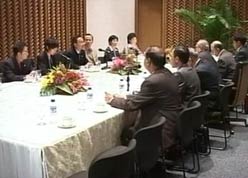
Vienna: There have been questions raising about China's role at the NSG, and there are some fears also that China may want to hit back by looking at a similar exception for Pakistan.
"Doubtless one of the reasons why Pakistan did not oppose this deal when it went through the IAEA phase is that Pakistan would also like a deal of this kind,” says, specialist on nuclear energy, King's College, James Acton.
“Whether or not they chose to get a Pakistan deal through, impossible at this stage, in the next few years unlikely, but in the longer term, who knows China has always been a strategic ally of Pakistan. And China would be the country to back an exemption to trade with Pakistan," he adds.
Pakistan had made it clear at the IAEA board meeting that it will be looking for a similar exception.
"I think for Pakistan it is pretty unlikely they could be making any kind of claim of this nature but it would be legitimate to make a claim," says expert on South Asian affairs at the School of Oriental and African Studies, Lawrence Saez.
China has had a strong hand in Pakistan's nuclear programme, and that has been at least indirectly a factor in the proliferation from Pakistan to North Korea and other countries. There are some fears that the India deal could now spur more of that.
"I'm afraid it will only provide a further excuse to Iran not to accept additional constraints, for North Korea to be less willing to give up its nuclear weapons, and for Pakistan and Israel to seek a similar exception,” says International Institute for Strategic Studies, Mark Fitzpatrick.
“And in the case of Pakistan, having so recently allowed its own nuclear technology to be sold to at least three other states who are seeking nuclear weapons, then there will be the danger of a precedent," he adds.
Pakistan held back its opposition at the IAEA, China at the NSG. But there remain lingering questions whether this nod is the last we've seen of them in this business, whether the deal could have a fallout in the region
SOURCE-IBN
NEWS WORLD
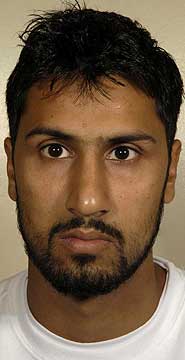
British Jury Renders Split Verdict in Airliner Bomb Plot
Washington Post - 40 minutes ago
By Kevin Sullivan LONDON, Sept. 8 -- A British jury reached a split decision Monday in Britain's most high-profile terrorism case, convicting three men of conspiracy to murder but reaching no decision on whether they intended to destroy transatlantic ...
Liquid bomb plot: three guilty of murder conspiracy guardian.co.uk
No Conviction on Key Charges in Liquid-Bomb Trial in London New York Times
Times Online - The Associated Press - Pakistan Dawn - The Age
all 751 news articles »
Sarkozy threatened to leave stormy Russian talks
Reuters India - 2 hours ago
By Francois Murphy TBILISI (Reuters) - French President Nicolas Sarkozy threatened to walk out of stormy talks with Russian officials before securing a deal with President Dmitry Medvedev on Monday on withdrawing troops from Georgia, a French official ...
Russia commits to Georgia pull-back AFP
Russia agrees to limited Georgia troop pull-out International Herald Tribune
The Associated Press - Reuters - Financial Times - Xinhua
all 2,443 news articles »
AFPUS lawmakers to press officials on Russia strategy
International Herald Tribune - 49 minutes ago
AP WASHINGTON: US lawmakers who have been urging a strong response to Russia's invasion of Georgia intend to question Bush administration and military officials Tuesday on how they intend to handle Russia's assertiveness in foreign affairs.
US Rules Out Unilateral Steps Against Russia New York Times
US puts Moscow nuclear deal on hold amid chilly relations Financial Times
AFP - Reuters India - The Associated Press - Voice of America
all 884 news articles »
SOURCE--GOOGLE NEWS
Prince Harry determined to return to frontline

A defiant Prince Harry is flying back to Britain tonight determined to return as soon as possible to frontline duties in Afghanistan
Before he boarded his flight the 23-year-old second Lieutenant in the Household Cavalry was moved from his base, only 500 yards from Taliban enemy lines in the volatile Helmand Province, to a secret and secure location after his presence in Afghanistan was leaked on an American web site.
Taliban insurgents have threatened to step up attacks on British forces after the news broke of Prince Harry’s secret deployment in the war zone.
A Taliban spokesman Zabihullah Mujahid said that his presence in Helmand Province meant that the Royal Family had joined in the “aggression against Muslims”.
“Prince Harry’s presence in Afghanistan encourages our fighters to launch more attacks on British forces. We think Prince Harry has been sent to Afghanistan only to boost the sagging morale of the British forces which are in serious trouble. For us he is just part of occupation forces. Instead of killing innocent people, the Prince should try to influence the British government to withdraw troops from Afghanistan.”
The decision to bring Prince Harry back to Britain for his own safety was taken by Air Chief Marshal Sir Jock Stirrup, the Chief of the Defence Staff early yesterday morning.
The Prince will go back to the Household Cavalry barracks at Windsor and keep a low profile over the coming weeks.
In an interview in Afghanistan he declared: “I don’t want to sit around in Windsor.”
Prince Harry acted as a Forward Air Controller, calling in air strikes, carrying out surveillance of Taliban fighters, and plotting bombing raid co-ordinates in the heat of battle.
His base came under mortar and machine gun attack five times every day. He was also personally involved in a firefight with the Taliban, fighting alongside Gurkha troops.
Brigadier Andrew Mackay, his commanding officer in Helmand, lavished praise on the work of the Prince in his 10-week tour of duty.
“He has shared the same risks, endured the same austerity and undergone the same moments of fears and euphoria that are part of conducting operations in this most complex of environments. A Forward Air Controller provides essential cover to those soldiers deployed on the ground. He controls the airspace, the aircraft that enter it and the release of any ordnance.
“It requires an individual of cool nerve, mental agility and an ability to make critical decisions in the heat of battle. I know from my own conversations with Second Lieutenant Wales that he has flourished in this most demanding of environments, relished the opportunity to serve his Regiment and his country and is deservedly immensely proud of his contribution. He has acquitted himself with distinction.”
Despite the risks Prince Harry is anxious to return to Afghanistan as he had completed only 10 weeks of his 14 week tour of duty.
One senior courtier said: “He is frustrated about coming back and leaving his friends behind. But he is realistic and understands the way of the world.”
Raul Castro declared Cuban president
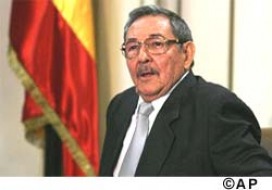
Monday, February 25, 2008 (Havana) Cuba's parliament named Raul Castro President on Sunday, ending nearly 50 years of rule by his brother Fidel but leaving the island's communist system unshaken.
In a surprise move, officials bypassed younger candidates to name a 77-year-old revolutionary leader, Jose Ramon Machado, to Cuba's No 2 spot - apparently assuring the old guard that no significant political changes will be made soon.
The retirement of the ailing 81-year-old president caps a career in which he frustrated efforts by 10 US presidents to oust him.
Raul Castro, 76, stressed that his brother remains ''commander in chief'' even if he is not president and proposed to consult with Fidel on all major decisions of state - a motion approved by acclamation.
Though the succession was not likely to bring a major shift in the communist government policies that have put Cuba at odds with the United States, many Cubans were hoping it would open the door to modest economic reforms that might improve their daily lives.
Raul Castro indicated at least one change is being contemplated: the revaluation of the Cuban peso, the national currency most people use to pay for government services such as utilities, public transportation and the small amount charged for their monthly food ration.
Cubans complain that government salaries averaging a little more than $19 a month do not cover basic necessities - something Raul Castro acknowledged in a major speech last year. But he said any change would have to be gradual to ''prevent traumatic and incongruent effects.''
In his first speech as president, Raul Castro suggested that the Communist Party as a whole would take over the role long held by Fidel, who formally remains its leader. The new president said the nation's sole legal party ''is the directing and superior force of society and the state.''
''This conviction has particular importance when the founding and forging generation of the revolution is disappearing,'' he added.
The US has said the change from one Castro to another would not be significant, calling it a ''transfer of authority and power from dictator to dictator light.''
Secretary of State Condoleezza Rice said Sunday Cubans have a right ''to choose their leaders in democratic elections'' and urged the government ''to begin a process of peaceful, democratic change by releasing all political prisoners, respecting human rights, and creating a clear pathway towards free and fair elections.''
Cuba's parliament chose a new 31-member ruling body known as the Council of State to lead the country. The council's president serves as the head of state and government.
The vote ended Castro's 49 years as head of the communist state in America's backyard. He retains his post as a lawmaker and as head of the Communist Party. But his power in government has eroded since July 31, 2006, when he announced he had undergone emergency intestinal surgery and was provisionally ceding his powers to Raul.
Musharraf to clear Pak image in EU
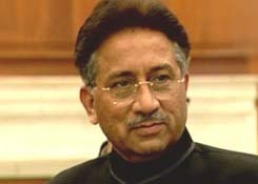
Associated Press
Sunday, January 20, 2008 (Islamabad)
President Pervez Musharraf on Sunday embarked on a four-nation trip to Europe, where he is expected to face tough questions from western leaders on the fight against terrorism that gained fresh spotlight with the arrest of 12 suspected Pakistani militants in Spain.
''The visit to Brussels, Paris, London and Davos is a wholesome package, with focus on improving Pakistan's image and removing certain misperceptions,'' Musharraf told reporters at Chaklala military airbase before leaving for his eight-day visit.
Musharraf has been grappling with a sharp spurt in militancy with security forces failing to rein in pro-Taliban extremists in northwestern tribal areas that have unleashed suicide bombings targeting civilians and the military.
On the eve of his visit, the Spanish government announced the arrest of 12 Pakistani and two Indian members of a suspected Islamic terrorist cell that was plotting an attack in the north-eastern city of Barcelona.
Also intelligence agencies reportedly warned four European countries, including UK and France which are in Musharraf's itinerary, against imminent terror attack.
''I am going to meet the foreign relations committee of the European Union, which is an important international player. We want to clear certain misperceptions of all the happenings in Pakistan and the region,'' Musharraf said.
The growing political uncertainty in the nuclear armed country, which was heightened by former premier Benazir Bhutto's assassination last month, has also drawn world attention.
Bhutto's killing forced the government to put off the general election scheduled for January 8 by six weeks.
Defending Pakistan
In response to a question, Musharraf said his visit was aimed at interacting with European Union leaders ''to give them the correct perception of whatever has been happening in Pakistan and the region and also, of course, global issues and to project our viewpoint.''
Asked about the ''image problem'' faced by Pakistan, he said he will especially focus on improving the country's image in Europe and removing ''misgivings and misunderstandings'' about Pakistan.
Musharraf said he was invited to address the annual World Economic Forum at Davos in Switzerland in his individual capacity.
Spanish interior minister Alfredo Perez Rubalcaba would not link the latest arrests with Musharraf's visit to Europe, but secret service sources told El Pais, a Spanish newspaper, that the new alert coincided with Musharraf's trip.
The source implied that the Spanish secret service National Intelligence Centre (CNI) had specific information on itinerant terrorists heading for the UK, France and Portugal.
A security official in London, however, said that he had no knowledge of any warning from Spain that an attack on Britain was imminent.
Spain was the scene of Europe's deadliest Islamist attack in March 2004 when four trains were bombed in Madrid, killing 191 commuters and injuring a further 1,800.
Barcelona and Madrid both have large Pakistani communities mainly involved in running restaurants and shops.
Musharraf said he has a lot of expectations from the visit, particularly with regard to ''image building'' as he will be meeting French President Nicholas Sarkozy, the Prime Ministers of Britain and Belgium and members of the EU's foreign relations committee and interacting with think tanks, the expatriate community and media.
UK seeks Indian help on terror
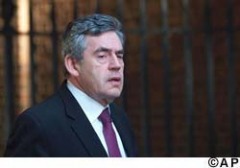
Press Trust of India
Sunday, January 20, 2008 (New Delhi)
Hailing India-UK ties as ''partnership among equals'', British Prime Minister Gordon Brown on Sunday pitched for intensified bilateral cooperation in fight against terrorism with particular focus on closer security coordination at airports and seaports.
Arriving in New Delhi on a two-day visit to ''build stronger and strengthening relationship'', Brown underscored the need for stronger economic ties, closer coordination on global issues like climate change and reform of international institutions besides cooperation in education and scientific fields.
Brown and Prime Minister Manmohan Singh will hold talks tomorrow on a wide range of issues, covering bilateral, regional and global subjects.
''I expect cooperation against terrorism is intensified in the years to come and I will talk these very issues when I meet Prime Minister Singh,'' he told reporters here soon after his arrival on a maiden visit as British Prime Minister.
He referred to the arrest of 14 people, including two Indians, in Spain yesterday in connection with an alleged terror plot and said the development raises ''questions on how we can cooperate internationally'' in the fight against terrorism.
''What I would like to see is greater contact between our two countries in winning the battle of hearts and minds, isolating extremist ideologues who try to poison the minds of young people and the views they have,'' Brown said after an interaction with a women's group.
PEACE FROM OCEAN OF VIOLENCE
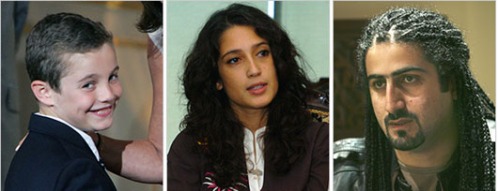
THURSDAY: Bin Laden’s Son
In an interview with The Associated Press today, Omar Osama bin Laden seemed to be defeated by his father at every turn.
He wants to be a peacemaker, but The A.P. quickly observes that “many may have a hard time getting their mind around the idea.”
He says peace between the West and Al Qaeda is possible, but his father sings a much different tune in his recent videos. (Not that there are any truce talks out West).
When he got married in April, his bride was mocked in a British newspaper as the “granny who married Osama bin Laden’s son.” She’s 52, he’s 26.
Even his biggest dream seems to be dimmed by his father, or at least the terrorists inspired by him in Africa.
In an effort to build support for a 3,000-mile horse race across North Africa, he’s billing it as “an equine version of the famous Paris-Dakar car rally,” The A.P. said.
Unfortunately, the outlook for that particular race is grim at the moment after it was canceled due to safety concerns.
And who was making it unsafe? A North African affiliate of Al Qaeda.
WEDNESDAY: Descendents of Gandhi’s Son
The problem at the center at this next one is many years older than the first one, but it will probably be resolved sooner.
As India mourned the assassination of Gandhi in 1948, his eldest son, Harilal, failed to scatter ashes as custom required. Their relationship was famously tortured and he “either boycotted the ceremony or arrived too late to perform his filial duties,” The London Times wrote.
After acquiring an urn of Gandhi’s ashes from a museum, the Gandhi family has “decided to give Harilal’s descendants the opportunity they never got,” Reuters said. On Jan. 30, the 60th anniversary of Gandhi’s death, they plan to perform the ritual at the Arabian Sea.
TUESDAY: Sarkozy’s Son
The 10-year-old son of President Nicolas Sarkozy of France, Louis, received death threats over the telephone earlier this month. The two suspects arrested, men in their early 20’s, face five years in prison, reports said.
And how do you get a world leader’s youngest son on the phone? The Associated Press cited an French report for details:
One of the suspects, an employee of French cellphone operator Orange, obtained a copy of the company’s celebrity client list, which gave Cecilia Sarkozy’s number. He passed the number on to a friend, a firefighter, who spoke to Louis Sarkozy on several occasions.
MONDAY: Bhutto’s Niece
Amid the continuing coverage of her aunt’s assassination in Pakistan, The Times of India reported on Fatima Bhutto’s e-mail issues.
Some overzealous fans of her Pakistani newspaper column, which always ends with her contact info, have been sending a ton of “bizzarro” requests lately:
“Could I have your cell number so we can discuss this further?” wrote one of her dedicated readers. “Seriously though, if you won’t give me your cell number, could we at least make friendship?” wrote another.
So far, there’s no sign that anything bizarro is happening to her on Facebook, unlike her cousin Bilawal.
Bush on Mideast tour, reaches Israel
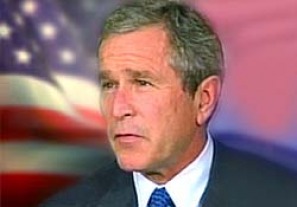
US President George W Bush opened his first presidential trip to Israel on Wednesday, seeking to build momentum for stalled Mideast peace talks and clear up confusion about whether the United States is serious about confronting Iran about its suspected nuclear ambitions.
Air Force One touched down at Ben-Gurion International Airport just before noon.
President Shimon Peres and Prime Minister Ehud Olmert were waiting to greet him. A red carpet was rolled up to the steps of Bush's plane, and military band and honour guard stood on the tarmac.
''Mr President,'' Bush said in a greeting to Peres. ''About time I got back here,'' said Bush, who visited Israel in 1998 before his election to the White House.
''Nice to be here,'' Bush told a dignitary as he shook hands along the red carpet.
Bush's challenge is to convince skeptical governments that, with just a year remaining in his presidency and Americans deep in the process of selecting his successor, he is willing to devote the time and effort necessary to bridge decades of differences in this troubled region.
Bilawal warns of Pak's disintegration

LONDON: Benazir Bhutto's son and heir, 19-year-old Oxford student Bilawal, has warned that Pakistan will "disintegrate" if free elections are not held and controversially re-affirmed his claim to the dynastic right to lead his mother's party by reasserting "the bloodline".
The confident, if self-confessedly nervous, untried heir to the Bhutto political legacy said, at his first full press conference here that his mother's death had imbued him with a sense of greater "resilience" and a consuming desire to bring democracy to Pakistan.
In an attempt to describe his vision of the Bhutto political dynasty's relationship with Pakistan, he dismissed fears for his own safety. "There is a Pakistani slogan. How many Bhuttos can you kill? From every house a Bhutto will come." Even as he admitted that he had not lived in Pakistan long enough to qualify as a son-of-the-soil leader and "experience to date is limited", Bilawal demonstrated he was a chip of the old block with his canny handling of questions.
In response to a question about his view of Indo-Pak relations, Bilawal would only offer this measured hope: that Pakistan would "peacefully co-exist with all its neighbours".
Admiring Western commentators agreed the newest Bhutto star's handling of the vexed India issue demonstrated his innate political agility.
With the world's media packed, sardine-like into the hastily-organised press conference, held at a small central London boutique hotel, Bilawal repeatedly defended his party's decision to make him leader with the bald truth: "This is how our party exercises leadership." Bilawal also said, "We do not believe that an investigation under the authority of the Pakistani government has the necessary transparency. Already so much forensic evidence has been destroyed."
PPP condemns poll postponement, but will take part

Larkana (PTI): The Pakistan People's Party (PPP) on Wednesday condemned the postponement of the general election in the aftermath of the assassination of its chief Benazir Bhutto but it will take part in the February 18 polls.
"The PPP condemns the decision, but we will take part," Asif Ali Zardari, Bhutto's husband and the new co-chairman of the party, told a press conference at her ancestral village of Naudero in Sindh province.
Reacting to President Pervez Musharraf's decision to seek help from Britain's Scotland Yard to investigate Bhutto's assassination, Zardari asked: "Where was Scotland Yard when Benazir Bhutto was attacked in Karachi on October 18?"
Bhutto was killed in a suicide attack in Rawalpindi on December 27. She had survived an earlier suicide attack on her motorcade in Karachi shortly after returning to Pakistan from exile on October 18.
Recalling what India's slain prime minister Rajiv Gandhi had said when his mother Indira Gandhi was assassinated -- "When a big tree falls, the earth trembles" -- Zardari said, "Modern technology has already told us all (about Bhutto's killing).
"These people are naive. They don't know their politics. They just know how to pull the trigger," he said.
Announcing that Bhutto's 'chehlum' (40th day of mourning) would be held on February 7, he said, "There is no world leader who has not condoled with me. The whole world is mourning. That was the greatness of Benazir Bhutto."
He said the government had come up with the excuse of the sensitive law and order situation during the Islamic month of Moharram, which begins on January 10, to postpone the polls.
Zardari also warned the government not to rig the elections to the national and four provincial assemblies. "If the government tries to rig polls, then don't blame us. We do not want confrontation. (PPP founder) Zulfiqar Ali Bhutto and our elders have taught us to love. Us din se daro, pehle hi aadha mulk gava chuke ho."
He insisted that the PPP would contact the United Nations and ask it to appoint a commission to probe Bhutto's assassination.
Zardari also said he would send PPP delegations to different countries and tell them to listen to the Pakistani people and not to the government of Musharraf.
He alleged that the Musharraf-led regime had only harmed the nation. Zardari said when Zulfiqar Ali Bhutto was about to be executed by the regime of late Gen Zia-ul-Haq, he had told the PPP to contest polls.
However, the "dictator who announced the polls thinking PPP will not participate decided to postpone the polls", he said, referring to Musharraf.
Zardari: Pak govt befitted from Bhutto's death
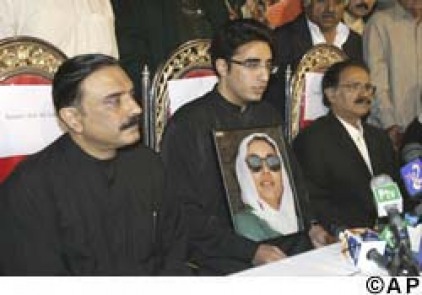
Press Trust of India Tuesday, January 1, 2008 (Washington) Accusing the Pakistan government of trying to spin its way out of the assassination of Benazir Bhutto, her husband and PPP leader Asif Ali Zardari has said that the Pervez Musharraf regime had the most to gain from the former premier's death.
''I think whoever has to gain from her death, and definitely the sitting government has to gain from her death. They should be held responsible,'' Zardari, who was named the co-chairman of his Pakistan People's Party on Sunday, said.
He described as ''too far-fetched'' government's claims that the Taliban and al Qaida were behind Bhutto's killing and called on US President George W Bush to ensure that an international investigation is carried out into the December 27 slaying of his wife.
''The government has been trying to put a new spin on it every day, but the latest piece of evidence that has come on the television is Channel 4 report of the exact way the assassin hit Benazir and the exact position and everything is now very clear that she was shot.
''I had maintained from the first day that she was shot either point blank or by a very high-powered sniper rifle. Now it seems that she was shot nearly point blank by a pistol,'' Zardari said, debunking the government's assertion that Bhutto died due an injury from the sunroof lever of her car.
''It just proves they've just been trying to muddy the water from the first day,'' he said in a telephone interview with CNN.
Zardari was asked if he believed that Baitullaa Masud, the Taliban leader with suspected al Qaida links was responsible for killing of Bhutto.
''When the first attack took place, that is what the government claimed. And Benazir herself had denied that. On the second day she said I will not hold him or any of these so-called al Qaidas responsible. She left a letter for you also in which she does not put the responsibility on the al Qaidas,'' he said.
Zardari said his Pakistan People's Party had called for an investigation team under the auspices of the UN, the United Nations to be assisted by the British authorities.
''We are going to be writing to the United Nations and we are going to be writing to the British prime minister and British Parliament and we are hoping to lobby in America for their support, too,'' he said.
Asked if he believed that the government of the President, Pervez Musharraf, was directly responsible for ordering the killing of his wife, he said he will not take any position at the moment as he has asked for an international investigation but maintained that government had failed to provide her adequate security.
''I will wait for the international investigation to come and find out... We'd written so many letters to them. We'd written, asked for international assistance for security, which they did not do. There are so many reasons that I should be apprehensive of the present government,'' Zardari said expressing doubts that the assassination could be the handiwork of the Taliban and the al Qaida.
Thailand votes for democracy today
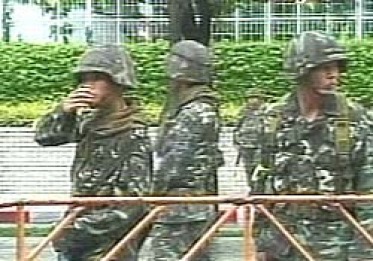
Associated Press
Sunday, December 23, 2007 (Bangkok)
People began voting in Thailand's general election on Sunday, billed as the country's return to democracy after 15 months of military-propped rule.
About 5,000 candidates from 39 political parties are contending for 480 seats in parliament's lower house.
There are 45 million eligible voters.
The election is expected to be a race between the People's Power Party - a thinly veiled version of deposed Prime Minister Thaksin Shinawatra's dissolved Thai Rak Thai Party led by ultra right-wing firebrand Samak Sundaravej and the Democrats led by 43-year old Oxford University graduate Abhisit Vejjajiva.
The polls, which opened at 8 am (0100 GMT), are being guarded by some 4,000 troops, most of them in southern Thailand where a Muslim insurgency has taken the lives of more than 2,600 people, according to a spokesman for the Internal Security Operations Command.
The balloting will end seven hours later and unofficial results are expected before midnight (1700 GMT) on Sunday.
Polls show the People's Power, considered a reincarnation of Thaksin's outlawed Thai Rak Thai Party, will probably garner the most votes but fall short of an outright majority.
A coalition government of the Democrats and smaller parties is seen as a possible outcome.
Ousted by a bloodless military coup 15 months ago, Thaksin faces a slew of corruption charges but remains popular among the rural masses and lower income urban residents to whom he offered cheap loans, virtually free medical care and village based development schemes.
Abhisit said on Saturday he would allow Thaksin, who is watching the election from Hong Kong, to return, ''to face charges here so justice will prevail.''
Russia to help Libya's nuclear pursuit
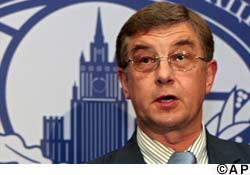
Associated Press
Thursday, December 20, 2007 (Moscow)
Russia offered to help Libya in its pursuit of nuclear energy and announced a visit to the former pariah state this weekend by Foreign Minister Sergei Lavrov, a report said.
''We are ready to help Libya realise its enduring right to attain civilian nuclear (energy),'' foreign ministry spokesman Mikhail Kamynin said, according to the Ria Novosti news agency.
Kamynin said Lavrov would visit Libya for two days from Sunday and would meet his Libyan counterpart Abdelrahaman Shalgham for discussions on a range of issues.
''There will be an exchange of opinions on topical international and regional matters based on a joint working relationship at the heart of the UN,'' the spokesman said.
Libya was one of five new members elected in October as non-permanent members of the UN Security Council for 2008 and 2009.
''We salute the participation of Libya in the work of the UN Security Council'' where it brings ''a contribution to the reinforcement of the non-proliferation regime and the maintenance of peace in Africa,'' Kamynin said.
''We are ready to cooperate tightly with Libya at the heart of the UN Security Council, bearing in mind our shared policies towards a majority of international problems,'' the spokesman added.
Libya was long accused by Western governments of seeking to acquire weapons of mass destruction.
But in late 2003 Libyan leader Moamer Kadhafi renounced all attempts to develop a non-conventional arsenal, clearing the way for the lifting of Western sanctions and the restoration of diplomatic relations.
New SKorea prez tough on NKorea
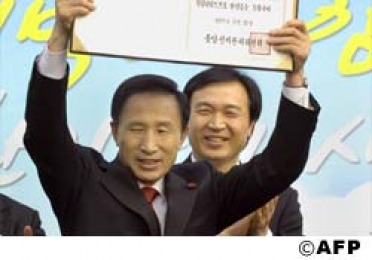
Associated Press
Thursday, December 20, 2007 (Seoul)
New South Korean President-elect Lee Myung-Bak says he will not shy away from criticising North Korea.
Polls suggest he was elected for his perceived economic prowess. In his first press conference since being elected, he talked about policy towards North Korea.
He said that he would seek to achieve a nuclear-free Korean peninsula and not shy away from criticising Pyongyang's human rights record.
Lee's conservative GNP (Grand National Party) ended a decade of liberal rule marked by the pursuit of a ''sunshine'' policy of engaging the North while refraining from verbal attacks on the authoritarian regime there.
Lee said he would not shrink from raising Pyongyang's shortcomings after he takes office February 25, 2007.
Lee began preparing to take the reins of his country on Thursday, after receiving a convincing mandate in Wednesday's election.
Lee's first function was a tribute to war dead at the National Memorial Park. The cemetery attached to the park honours those who fought the Japanese during World War II and the North Koreans and Chinese during the civil war of the early 1950s.
The former Hyundai Chief Executive Officer and Seoul mayor received 48.7 per cent of the vote, the highest total since multi-party democracy was instituted in the 1980s.
His victory was widely welcomed on the streets of Seoul on Thursday, after a campaign described by some as colourful and acrimonious.
As pre-election polls had suggested, people on the streets said Lee must tackle the economy and end a perceived economic malaise under the current government of President Roh Moo-Hyun.
The new President inherits an economy that is already growing at five per cent, has recently concluded a free trade agreement with the United States and has seen its trade with China quadruple in five years.
Protestors lathi-charged in Pak
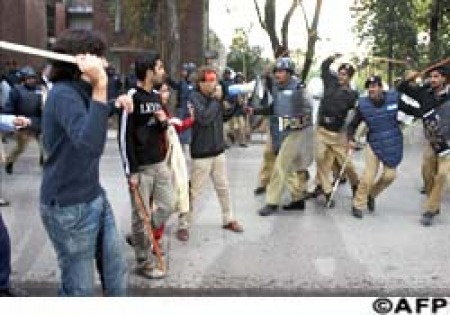
Police in Pakistan lathi-charged and used tear gas to disperse about 300 people demonstrating against Pakistani President Pervez Musharraf in the capital, Islamabad on Monday.
The protestors also included members of former cricketer Imran Khan's party Protesters in Pakistan, which included members of former cricketer Imran Khan's party were lathi charged and tear gassed yesterday.
They were demonstrating against Pakistan President Pervez Musharraf in capital, Islamabad. Dozens of them were also detained.
Over 300 protesters were trying to march towards an enclave were Pakistan's deposed chief justice Iftikar Choudhury is being held under house arrest. The protestors were demanding the restoration of judges forcefully retired by the President.
Meanwhile, the opposition claims that the elections will not be fair and a fair vote would have put them in a position to challenge Musharraf's new presidency and new rules brought into place when emergency was imposed by Musharraf when he was still in uniform.
Musharraf lifted Pakistan's six-week state of emergency on Saturday, restoring the constitution. But critics say that lifting of emergency would have no impact as to whether upcoming parliamentary elections would be free and fair.
Iraq takes control of Basra from British army
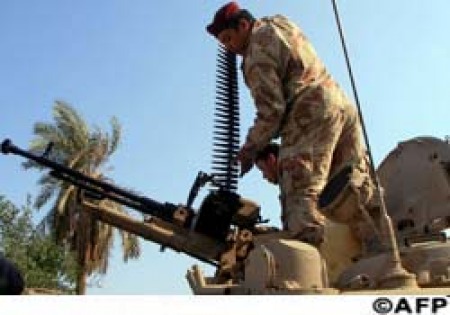
Agence France-Presse
Sunday, December 16, 2007 (Basra)
Iraq formally took over security control of the southern oil province of Basra from British forces on Sunday paving the way for Britain to sharply reduce its nearly 5,000-strong troop presence.
The memorandum of understanding ordering the transfer was signed by Basra governor Mohammed al-Waili and Major General Graham Binns, the head of British forces in Basra, Iraq's second city.
''The handover means victory for Iraq and defeat to its enemies,'' Iraq's national security adviser Muwaffaq al-Rubaie said at the handover ceremony.
''We are celebrating a new marriage today. This achievement is one of the main achievements of the national unity government. It has come after sacrifices and direct support from our sons and all Iraqis. Our biggest challenge is to maintain the security in Basra.''
Basra is the ninth of Iraq's 18 provinces to be returned to local control by the US-led coalition.
British troops were greeted as liberators when they rolled into Basra but never subsequently succeeded in winning over the predominantly Shiite population, and few residents will mourn their departure.
''The handover of the province will give life back to a region which has suffered so much,'' proclaimed a banner on a main road into the city.
''It's our wish to see the Iraqis take responsibility for security in place of the British. They never understood anything except the language of the bullet,'' complained Abu Ahmed, a 55-year-old parking attendant.
